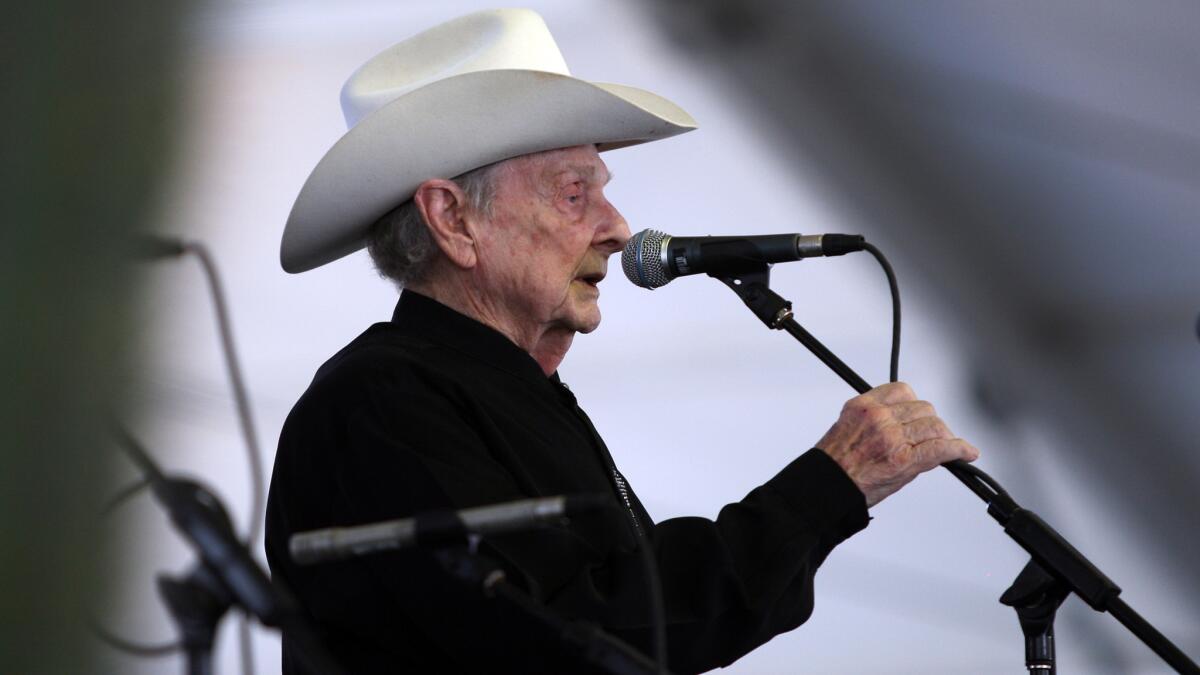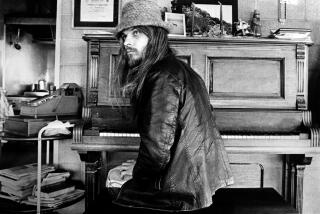Bluegrass music patriarch Ralph Stanley dies at 89

- Share via
Reporting from Nashville, Tenn. — Ralph Stanley “carried the ancient sounds,” in the words of his protege Ricky Skaggs.
Skaggs and others noted an uncanny quality in the style of the bluegrass patriarch — an ability to summon the mysterious. Stanley, who died Thursday at 89, was mesmerizing new fans with it to his last days.
The icon of Appalachian music had learned the banjo at his mother’s knee in east Virginia. With his father’s mountain songs and the hymns of his Primitive Baptist church, it seemed to be all the teaching he needed. “I never wanted to branch out,” he once said.
His death at home in Sandy Ridge, Va., from complications of skin cancer ended a singular seventy-year career. Stanley and his brother Carter first formed the Stanley Brothers and the Clinch Mountain Boys in 1946 and helped popularize the bluegrass genre. After Carter died in 1966, Ralph Stanley went on as the form’s reluctant standard-bearer, influencing generations of country musicians.
Stanley moved the genre forward by keeping his focus strictly backward.
Stardom didn’t tempt him. Fame couldn’t pry him from his mountain home; commercial success never smoothed his gnarled sound.
All he wanted was to make a living, he said, and “do it the way I feel it.”
Never having strayed far from his mountain roots, he never had to seek them. He simply waited for listeners to come seeking him, which they did.
In 1992, for example, forty years after his first recordings, Stanley racked up Grammy nominations for the album “Saturday Night & Sunday Morning,” a pairing of rowdy bluegrass’ night music with gospel hymns.
He was in his late 60s at the time, had already retired once, and had the sawdusty status of a bluegrass patriarch. Yet the album drew comparisons to grunge and rap, and featured a number of young, commercially successful stars, whose adulation helped propel Stanley to a new late-life popularity.
But he wasn’t finished. In 2000, Stanley sang the a cappella of the dirge “O Death” for the Ku Klux Klan scene in the Coen brothers’ hit movie “O Brother, Where Art Thou?” His performance transfixed yet another generation of fans and brought his music into the spotlight again.
Stanley, now in his 70s, won a Grammy for the haunting performance, beating out Tim McGraw, Ryan Adams, Willie Nelson, Johnny Cash and Lyle Lovett. He was the focus of a successful tour and documentary inspired by the soundtrack, and The “O Brother” album was a runaway hit, topping the Billboard 200 chart as well as the country albums and soundtrack charts. It sold millions of copies.
The following year, Stanley and Jim Lauderdale would win a Grammy for best bluegrass album for “Lost in the Lonesome Pines.”
Stanley was old enough to regret that his prominence came so late. But he said he was gratified that, once again, fans had rediscovered his “old time music.” Age seemed to have only enhanced the archaic power of his high tenor voice and his style, which one Times writer dubbed “high lonesome.”
Ralph Edmond Stanley was born Feb. 25, 1927, in McClure, Va., the son of Lucy Jane and Lee Stanley. The father was a sawmill operator, but both parents were also musicians. Stanley’s banjo-playing mother taught taught her boys the old-time claw hammer style, in which the player’s fingers strike downward at the strings.
The brothers grew up in an Appalachian setting of coal mines and deep forests, and their band was heavily influenced by Grand Ole Opry star Bill Monroe.
The Stanleys created a distinctive three-part harmony that combined the lead vocal of Carter with Ralph’s tenor and an even higher part sung by bandmate Pee Wee Lambert. Carter’s songwriting professed a passion for the landscape and reflected loss and loneliness. His work included “White Dove,” which describes the mourning and suffering after the death of a mother and father. In 1951, they popularized “Man of Constant Sorrow,” which was later recorded by Bob Dylan.
“Ralph Stanley was elemental. His voice was freshwater, wind, sky, and stone,” said Kyle Young, CEO of the Country Music Hall of Fame and Museum.
The brothers were swept into the burgeoning folk movement, and they toured the country playing folk and bluegrass festivals during the ’60s, including the Newport Folk Festival in 1959 and 1964. But when Carter died of liver disease in 1966, Ralph nearly quit. His brother had been the main songwriter, lead singer and front man, and Ralph, by his own account, was withdrawn and shy.
But he pressed on, drawing even deeper from his Appalachian roots. He reformed the Clinch Mountain Boys band to include Ray Cline, vocalist Larry Sparks and Melvin Goins. He would change the lineup of the band over the years, later including Jack Cooke.
Chief among the younger artists he mentored were Keith Whitley and Ricky Skaggs. The pair had joined his band as teenagers after Stanley had arrived late for a concert one day and found them singing on stage to occupy the waiting crowd.
Skaggs praised Stanley as a musician who found his music in “the mountains, in the hollows, in the people and in the churches.”
Dylan and the Grateful Dead’s Jerry Garcia were also aficionados, and Dylan joined him for a remake of the Stanley Brothers’ “Lonesome River” in 1997.
“I call him the king of mountain soul,” Lauderdale said. “He had that magical quality about him.”
After “O Brother,” T-Bone Burnett, the L.A.-based musician who oversaw the soundtrack and produced “O Death,” explained the impact of the Stanley Brothers in terms of the “serious danger” of their music.
They were “the punks of traditional music,” Burnett told the Times in 2001. He said they had a “wild energy that had as much to do with Elvis Presley and the Sex Pistols as with Jimmie Rodgers.”
Despite health problems, Stanley continued to record and tour until recently, often performing with his son Ralph Stanley II on guitar and his grandson Nathan on mandolin.
He is survived by his wife of 47 years, Jimmie Stanley. He had three children, seven grandchildren and one great-grandchild.
Leovy writes for the Times; Hall writes for the Associated Press.
ALSO
Marine in iconic Iwo Jima flag photo was misidentified
Supreme Court deadlock deals defeat to Obama immigration plan
Led Zeppelin didn’t steal music for ‘Stairway to Heaven,’ jury finds
Leovy writes for the Times; Hall writes for the Associated Press.
More to Read
Start your day right
Sign up for Essential California for the L.A. Times biggest news, features and recommendations in your inbox six days a week.
You may occasionally receive promotional content from the Los Angeles Times.






